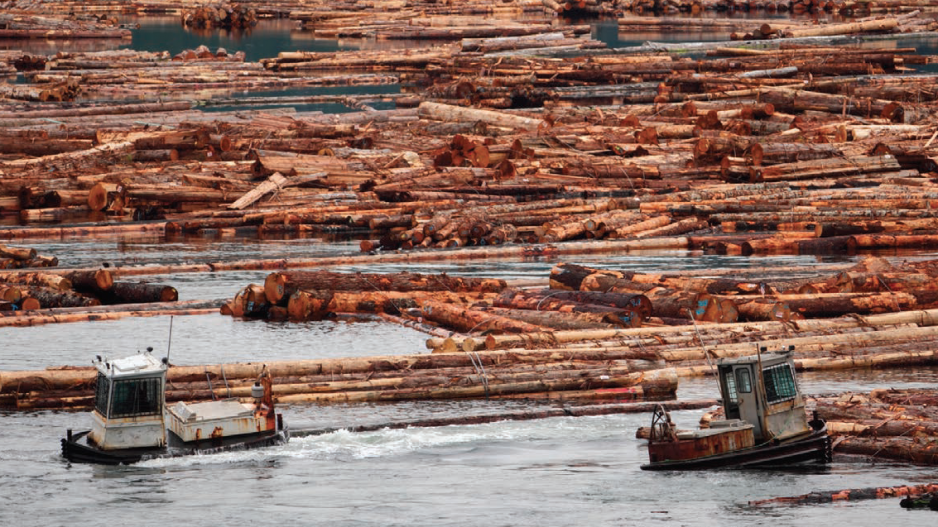The American lumber industry is hoping third-quarter financial results will provide additional data strengthening its case that Canadian lumber exports are harming it.
The U.S. Lumber Coalition, the lobby group representing the American softwood industry, is expected to file a trade complaint with the U.S. Department of Commerce if negotiations break down between the Canadian and American governments to settle the lumber dispute. Included in that petition will be quarterly results from publicly traded companies.
“If we have everyone’s books for the third quarter, the injury case might look a lot better,” the coalition’s lead lawyer, David Yocis, said in a September interview.
The coalition was handed some of that evidence on October 21 when one major company, Potlatch Corp. (Nasdaq:PCH), reported depressed revenue from log sales despite higher overall lumber prices. And on October 24, Canada’s largest lumber producer, West Fraser Timber (TSX:WFT), reported strong lumber results thanks to stronger prices in the U.S. and a weaker Canadian dollar.
Industries on both sides of the border are not commenting on the status of the softwood lumber agreement talks, other than to describe them as dynamic. If the talks fail, the U.S. is expected to impose duties of about 25% that could be in place on Canadian lumber shipments by April 1, 2017. The U.S. accounts for 69% of all Canadian lumber production, and International Trade Minister Chrystia Freeland has described the lumber industry as a driver of Canadian growth. Access to the U.S. market is essential for Canada, she said in Parliament on October 17.
The issue is to find a formula that provides the American industry with enough certainty that it will sign away its right to trade action yet does not cripple the Canadian industry.
The coalition wants a hard cap on Canadian exports, which means imposing quota restrictions on all lumber shipments by Canadian companies.
The B.C. lumber sector, the largest player in the Canadian industry, opposes that solution, which was tried in 1996. It led to chaos over quota allocations and put an end to growth in Western Canada. Instead, B.C. prefers an export tax that would raise lumber costs but not hamper strategic growth plans.
On the political front, the coalition is gaining support in the U.S. Congress by claiming that Canada is not honouring a June 29 joint statement by Prime Minister Justin Trudeau and U.S. President Barack Obama that says a key feature of any new agreement would be “an appropriate structure designed to maintain Canadian exports at or below an agreed U.S. market share to be negotiated.”
“The joint statement clearly indicates at or below market share,” coalition executive director Zoltan van Heyningen said in a previous interview. “Where is the stumbling block?”
However, the coalition leaves out the second half of the statement, which says that any agreement to reduce market share must include “the stability, consistency and flexibility to achieve confidence in both industries.”
That is consistent with an export tax, the B.C. industry maintains.
Paul Quinn, analyst at RBC Capital Markets, said that despite the rhetoric, Canada will likely have to consider options above and beyond the export tax restrictions that were part of the 2006 Softwood Lumber Agreement, which expired October 12, 2015. Its main features were a sliding export tax in the West and quota restrictions in the East.
“We’ve heard from Day 1 that the U.S. coalition didn’t like the last softwood lumber agreement because it didn’t accomplish what they wanted,” he said.
Quinn sees foreign exchange fluctuations as a critical issue. Linking an export tax to foreign exchange could be an option, he said.
However, foreign exchange is only one of many factors in what Yocis says is an uneven playing field between the lumber businesses in the two countries.
An export tax, even if it takes into account currency fluctuations, will not provide the certainty the U.S. industry is seeking.
“Why should we sign away our right to trade cases in return for an export tax which adds to the uncertainty?” Yocis asked. “Once we accept that, the burden is on us to say, ‘Things have changed; these export tax rates need to be adjusted.’ Our sense is this: there is a quota deal out there that is better for the U.S. industry and better for the Canadian industry as a whole than [fighting] a trade case, so we should be able to find one.”
At the heart of the dispute is a long-standing American allegation that its industry faces unfair competition from Canada because provincial governments, who own the timber resource, charge stumpage fees for Crown logs that are less than market value.
Canada denies that allegation and in preceding lumber wars it has successfully challenged U.S. claims before international trade tribunals. •




